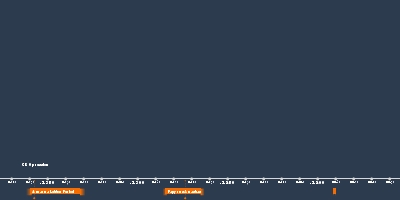"Hapiru" activity in the Near East (1 Jan 1820 Jahr v. Chr. – 1 Jan 1250 Jahr v. Chr.)
Beschreibung:
From Wikipedia:"In the time of Rim-Sin I (1822 BCE to 1763 BCE), the Sumerians knew a group of Aramaean[clarification needed] nomads living in southern Mesopotamia as SA.GAZ, which meant "trespassers".[14] The later Akkadians inherited the term, which was rendered as the calque Habiru, properly ʿApiru. The term occurs in hundreds of 2nd millennium BCE documents covering a 600-year period from the 18th to the 12th centuries BCE and found at sites ranging from Egypt, Canaan and Syria, to Nuzi (near Kirkuk in northern Iraq) and Anatolia (Turkey).[15][16]
Idrimi of Alalakh
Not all Habiru were murderers and robbers:[17] in the 18th century BCE a north Syrian king named Irkabtum (c. 1740 BCE) "made peace with [the warlord] Shemuba and his Habiru,"[18] while the ʿApiru, Idrimi of Alalakh, was the son of a deposed king, and formed a band of ʿApiru to make himself king of Alalakh.[19] What Idrimi shared with the other ʿApiru was membership of an inferior social class of outlaws, mercenaries, and slaves leading a marginal and sometimes lawless existence on the fringes of settled society.[20]"
Interestingly, this timeline of references to 'Apiru-Habiru peoples begins around the time of Abraham and in the region near Haran & Padan Aram, and then moves southward into the Levant. The term seemingly is not used during the Hyksos period, and comes back into use shortly after. A very similar pattern to that which we see in the biblical account.
Zugefügt zum Band der Zeit:
Datum:
1 Jan 1820 Jahr v. Chr.
1 Jan 1250 Jahr v. Chr.
~ 570 years
